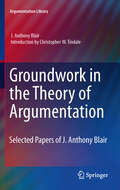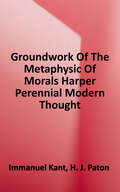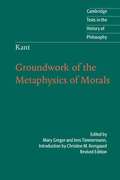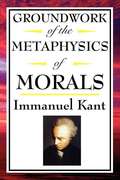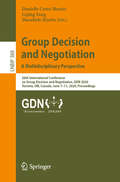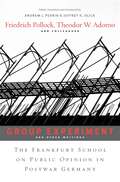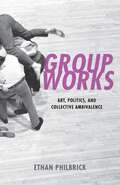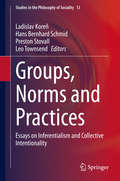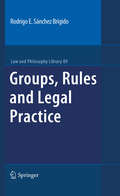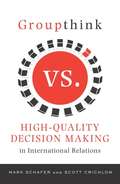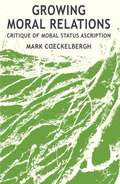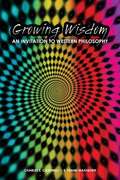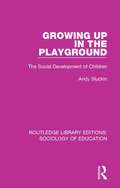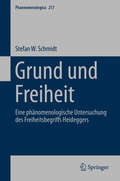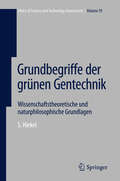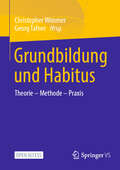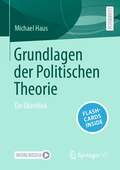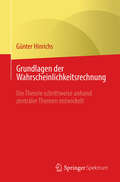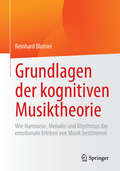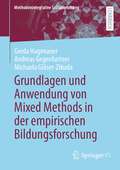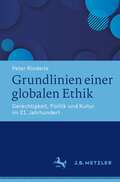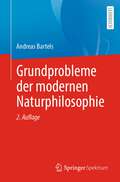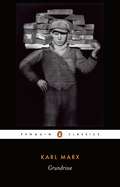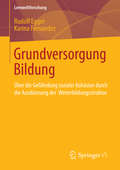- Table View
- List View
Groundwork in the Theory of Argumentation
by Christopher W. Tindale J. Anthony BlairJ. Anthony Blair is a prominent international figure in argumentation studies. He is among the originators of informal logic, an author of textbooks on the informal logic approach to argument analysis and evaluation and on critical thinking, and a founder and editor of the journal Informal Logic. Blair is widely recognized among the leaders in the field for contributing formative ideas to the argumentation literature of the last few decades. This selection of key works provides insights into the history of the field of argumentation theory and various related disciplines. It illuminates the central debates and presents core ideas in four main areas: Critical Thinking, Informal Logic, Argument Theory and Logic, Dialectic and Rhetoric.
Groundwork of the Metaphysic of Morals (Harper Perennial Modern Thought Ser.)
by Immanuel KantThe finest single-volume introduction to Kant's ethics available in English. —Philosophical Review, on the H. J. Paton translation Considered one of the most profound, influential, and important works of world philosophy, Groundwork of the Metaphysic of Morals introduces his famous Categorical Imperative and lays down a foundation for all of Immanuel Kant's writings. In it, Kant illuminates the basic concept that is central to his moral philosophy and, in fact, to the entire field of modern ethical thought: The Categorical Imperative, the supreme principle of morality, stating that all decisions should be made based on what is universally acceptable. Featuring the renowned translation and commentary of Oxford's H. J. Paton, this volume has long been considered the definitive English edition of Kant's classic text. "Kant's Groundwork of the Metaphysic of Morals," Paton writes in his preface, "is one of the small books which is truly great: it has exercised on human thought an influence almost ludicrously disproportionate to its size."
Groundwork of the Metaphysics of Morals
by Immanuel Kant Christine M. Korsgaard Jens Timmermann Mary GregorPublished in 1785, Immanuel Kant's Groundwork of the Metaphysics of Morals ranks alongside Plato's Republic and Aristotle's Nicomachean Ethics as one of the most profound and influential works in moral philosophy ever written. In Kant's own words, its aim is to identify and corroborate the supreme principle of morality, the categorical imperative. He argues that human beings are ends in themselves, never to be used by anyone merely as a means, and that universal and unconditional obligations must be understood as an expression of the human capacity for autonomy and self-governance. As such, they are laws of freedom. This volume contains Mary Gregor's acclaimed translation of the work, sympathetically revised by Jens Timmermann, and an accessible, updated introduction by Christine Korsgaard.
Groundwork of the Metaphysics of Morals
by Immanual KantKant's Groundwork of the Metaphysics of Morals is one of the most important works in modern moral philosophy. It belongs beside Plato, Aristotle, Machiavelli, and Hobbes. Here Kant sets out to articulate and defend the Categorical Imperative - the fundamental principle that underlies moral reasoning - and to lay the foundation for a comprehensive account of justice and human virtues.
Group Decision and Negotiation: 20th International Conference on Group Decision and Negotiation, GDN 2020, Toronto, ON, Canada, June 7–11, 2020, Proceedings (Lecture Notes in Business Information Processing #388)
by Liping Fang Danielle Costa Morais Masahide HoritaThis book constitutes the refereed proceedings of the 20th International Conference on Group Decision and Negotiation, GDN 2020, which was planned to be held in Toronto, ON, Canada, during June 7–11, 2020. The conference was cancelled due to the Coronavirus pandemic. Nevertheless, it was decided to publish the proceedings, because the review process had already been completed at the time the cancellation was decided. The field of Group Decision and Negotiation focuses on decision processes with at least two participants and a common goal but conflicting individual goals. Research areas of Group Decision and Negotiation include electronic negotiations, experiments, the role of emotions in group decision and negotiations, preference elicitation and decision support for group decisions and negotiations, and conflict resolution principles. The 14 full papers presented in this volume were carefully reviewed and selected from 75 submissions. They were organized in topical sections named: Conflict Resolution, Preference Modeling for Group Decision and Negotiation, Intelligent Group Decision Making and Consensus Process, Collaborative Decision Making Processes.
Group Experiment and Other Writings: The Frankfurt School on Public Opinion in Postwar Germany
by Theodor W. Adorno Jeffrey K. Olick Andrew J. Perrin Friedrich PollockTheodor W. Adorno and his Frankfurt School colleagues published their findings on their group discussion experiments that delved deeper into the process of opinion formation.Andrew J. Perrin and Jeffrey K. Olick make a case that these experiments are an important missing link in the ontology and methodology of current social-science survey research.
Group Works: Art, Politics, and Collective Ambivalence
by Ethan PhilbrickAn exciting new reflection on the role of artistic collaboration, collectivism, and the politics of group formation in the neoliberal era.The artist and author Ethan Philbrick’s Group Works re-imagines the group by undertaking an historiographic archaeology of group aesthetics and politics.Written against both phobic and romantic accounts of collectivity, Group Works contends that the group emerges as a medium for artists when established forms of collective life break down. Philbrick pairs group pieces in dance, literature, film, and music from the 1960s and 1970s downtown Manhattan scene alongside a series of recent group experiments: Simone Forti’s dance construction, Huddle (1961), is put into relation with contemporary re-performances of Forti’s score and huddling as a feminist political tactic; Samuel Delany’s memoir of communal living, Heavenly Breakfast: An Essay on the Winter of Love (1969/78), speaks to performance artist Morgan Bassichis’s 2017 communal musical adaptation of Larry Mitchell’s 1977 text, The Faggots and Their Friends Between Revolutions; Lizzie Borden’s experimental documentary of feminist collectivity, Regrouping (1976), sits alongside visual artist Sharon Hayes’s 2014 piece on Manhattan’s Pier 54, Women of the World Unite! they said; and Julius Eastman’s insurgent piece of chamber music for four pianos, Gay Guerrilla (1979), resonates alongside contemporary projects that take up Eastman’s legacy by artists such as Tiona Nekkia McClodden.By analyzing works that articulate the politics of race, gender, and sexuality as questions of group formation, Philbrick approaches the group not as a stable, idealizable entity but as an ambivalent way to negotiate and contest shifting terms of associational life. Group Works presents an engaging exploration of what happens when small groups become a material and medium for artistic and political experimentation.
Groups, Norms and Practices: Essays on Inferentialism and Collective Intentionality (Studies in the Philosophy of Sociality #13)
by Hans Bernhard Schmid Ladislav Koreň Preston Stovall Leo TownsendThis edited volume examines the relationship between collective intentionality and inferential theories of meaning. The book consists of three main sections. The first part contains essays demonstrating how researchers working on inferentialism and collective intentionality can learn from one another. The essays in the second part examine the dimensions along which philosophical and empirical research on human reasoning and collective intentionality can benefit from more cross-pollination. The final part consists of essays that offer a closer examination of themes from inferentialism and collective intentionality that arise in the work of Wilfrid Sellars. Groups, Norms and Practices provides a template for continuing an interdisciplinary program in philosophy and the sciences that aims to deepen our understanding of human rationality, language use, and sociality.
Groups, Rules and Legal Practice
by Rodrigo Eduardo Sánchez BrigidoEver since Hart´s The Concept of Law, legal philosophers agree that the practice of law-applying officials is a fundamental aspect of law. Yet there is a huge disagreement on the nature of this practice. Is it a conventional practice? Is it like the practice that takes place, more generally, when there is a social rule in a group? Does it share the nature of collective intentional action? The book explores the main responses to these questions, and claims that they fail on two main counts: current theories do not explain officials´ beliefs that they are under a duty qua members of an institution, and they do not explain officials´ disagreement about the content of these institutional duties. Based on a particular theory of collective action, the author elaborates then an account of certain institutions, and claims that the practice is an institutional practice of sorts. This would explain officials´ beliefs in institutional duties, and officials´ disagreement about those duties. The book should be of interest to legal philosophers, but also to those concerned with group and social action theories and, more generally, with the nature of institutions.
Groupthink Versus High-Quality Decision Making in International Relations
by Scott Crichlow Mark Schafer-Are good and bad outcomes significantly affected by the decision-making process itself? Indeed they are, in that certain decision-making techniques and practices limit the ability of policymakers to achieve their goals and advance the national interest. The success of policy often turns on the quality of the decision-making process. Mark Schafer and Scott Crichlow identify the factors that contribute to good and bad policymaking, such as the personalities of political leaders, the structure of decision-making groups, and the nature of the exchange between participating individuals. Analyzing thirty-nine foreign-policy cases across nine administrations and incorporating both statistical analyses and case studies, including a detailed examination of the decision to invade Iraq in 2003, the authors pinpoint the factors that are likely to lead to successful or failed decision making, and they suggest ways to improve the process. Schafer and Crichlow show how the staffing of key offices and the structure of central decision-making bodies determine the path of an administration even before topics are introduced. Additionally, they link the psychological characteristics of leaders to the quality of their decision processing. There is no greater work available on understanding and improving the dynamics of contemporary decision making.
Growing Moral Relations
by Mark CoeckelberghNew scientific and technological developments challenge us to reconsider our moral world order. This book offers an original philosophical approach to this issue: it makes a distinctive contribution to the development of a relational approach to moral status by re-defining the problem in a social and phenomenological way.
Growing Slowly Wise: Building a Faith that Works
by David RoperDavid Roper discusses the Book of James and connects his insights to human problems.
Growing Wisdom: An Invitation to Western Philosophy
by Charles Cardwell E. Frank MashburnGrowing Wisdom: An Invitation To Western Philosophy COVERS the following subtopics: Society and Politics Philosophy Knowledge and Reality God Human Nature and Personal Identity
Growing up in the Playground: The Social Development of Children (Routledge Library Editions: Sociology of Education #51)
by Andy SluckinFirst published in 1981, this work is based on the author’s research in the playgrounds of two Oxford schools. It describes the order amongst the apparent chaos by relating the playtime activities – the games, rhymes and taunts of five-to-ten-year-olds in first and middle schools – to children’s goals, problems and solutions. It shows how children learn and display in the playground a remarkably complex set of social skills and the study clearly demonstrates the importance of playtime for preparing a child to cope in the adult world.
Grund und Freiheit
by Stefan W. SchmidtIn der vorliegenden Studie geht der Autor den mannigfaltigen Zusammenhängen von Gründung und Begründung in der Welt nach, um mit Martin Heidegger zu zeigen, dass all diese Zusammenhänge Freiheit voraussetzen, aus Freiheit hervorgehen oder doch zumindest freiheitsbedingt sind. Die Analyse des ontologischen Freiheitsbegriffs Heideggers nimmt so die Gestalt einer phänomenologischen Destruktion von ,,Grund" an. Der Fokus des Buches liegt auf Heideggers tatsächlichem Gebrauch des Begriffs ,,Freiheit". Ausgangspunkt der Untersuchung ist das Diktum ,,Die Freiheit ist der Grund des Grundes". Dieser Satz fällt in Heideggers ,,metaphysische Periode", die sich auf den Zeitraum von 1928 bis 1930 beschränkt und in der er versucht, einen positiven Begriff von Metaphysik, eine Metaphysik des Daseins, zu entwerfen. Zur Aufschlüsselung dieses Diktums konzentriert sich die Untersuchung daher auf eben jenen Zeitraum. Im ersten Kapitel wird der Begriff des Grundes systematisch und philosophiehistorisch untersucht, um unsere Praxis des Begründens offenzulegen und aufzuzeigen, wie diese Praxis bereits den Begriff von Welt präsupponiert. Das zweite Kapitel widmet sich Heideggers positivem Verständnis von Freiheit und weist nach, wie die beiden Begriffe ,,Grund" und ,,Freiheit" mittels des Weltbegriffs miteinander verwoben sind. Das dritte Kapitel zieht ein Resümee und setzt die Ergebnisse in einen breiteren phänomenologischen Kontext, der nicht allein auf Heidegger beschränkt bleibt. Das vierte und letzte Kapitel setzt sich mit den ethischen Implikationen von Heideggers ontologischem Freiheitsbegriff auseinander.
Grundbegriffe der grünen Gentechnik
by Susanne HiekelDie Autorin analysiert grundlegende Begrifflichkeiten, die in der normativen Argumentation zur grünen Gentechnik verwendet werden, und liefert damit eine philosophisch fundierte Argumentationsgrundlage. Sie geht von der Annahme aus, dass Begriffe wie z. B. Lebewesen, (natürliche) Art oder Gen in verschiedenen Bedeutungsnetzen unterschiedlich konnotiert sind und daher nicht kontextunabhängig definiert werden können. Die Begriffsklärung ist notwendige Voraussetzung, um zu einer angemessenen Bewertung der grünen Gentechnik kommen zu können.
Grundbildung und Habitus: Theorie – Methode – Praxis
by Georg Tafner Christopher WimmerDieser Open-Access-Band befasst sich mit dem Zusammenhang von Grundbildung und sozialer Ungleichheit. Er bietet einen Überblick über theoretische, konzeptionelle und methodische Grundlagen und thematisiert habituelle Einflüsse sowie konkrete Praktiken im Bereich der Grundbildung. Die Beiträge sind von namhaften Expert*innen aus Soziologie und Erziehungswissenschaft verfasst und werden durch Praxisberichte ergänzt. Die Besonderheit des Bandes liegt darin, dass soziale Ungleichheit nicht nur als abstrakter Begriff, sondern in Anlehnung an Pierre Bourdieu als gelebte Realität mitsamt ihren relationalen und habituellen Aspekten verstanden wird.
Grundlagen der Politischen Theorie: Ein Überblick
by Michael HausDas Lehrbuch verbindet eine bewährte Orientierung an Schlüsselautor*innen mit einer innovativ-systematischen Darstellungsweise. Mit dem Verständnis von Politischer Theorie als Systematisierung der Rechtfertigung und Kritik politischer Verhältnisse wird ein weiter, aber zugleich eingegrenzter Fokus gesetzt. Im ersten Teil („Klassische Perspektiven“) werden jeweils zwei Figuren der politischen Ideengeschichte kapitelweise gegenübergestellt. Auch im zweiten Teil („Zeitgenössische Perspektiven“) werden zentrale Argumentationsansätze mittels einer vergleichenden Betrachtung von Theoretiker*innen erschlossen. Darüber hinaus werden Forderungen nach einer grundlegenden Neuausrichtung der Politischen Theorie behandelt. Eine übergreifende Klammer bilden Reflexionen zu den Konzepten „Macht“, „Gerechtigkeit“ und „Demokratie“.
Grundlagen der Wahrscheinlichkeitsrechnung: Die Theorie schrittweise anhand zentraler Themen entwickelt
by Günter HinrichsBei häufigem Würfeln fällt normalerweise jede Zahl in ungefähr 1/6 der Fälle. Kann man dieses sogenannte „Gesetz der großen Zahlen“ beweisen oder wenigstens irgendwie erhellen? Auf welcher Grundlage? In diesem Buch wird der folgende mögliche Zugang entwickelt: Man schaut sich die verschiedenen theoretisch möglichen Zahlenfolgen in einer langen Würfelreihe an, fragt nach „typischem“ (d. h. in den meisten von ihnen zu findendem) Verhalten und erkennt das Gesetz der großen Zahlen als solches. Dieser Ansatz fügt sich gut mit der Vorstellung zusammen, dass theoretisch alles aus der (Newtonschen) Physik berechenbar sein könnte. Dies wird ausgearbeitet und Hand in Hand entsteht damit ein mathematischer Rahmen zur Beschreibung „zufälligen“ Geschehens solcher Art. Der so entwickelte mathematische Rahmen fällt elementarer und transparenter als im oft üblichen axiomatischen Zugang aus. Die gestellte Frage ist abstrakt, aber auf größtmögliche abstrakte Allgemeinheit wird pragmatisch verzichtet. Aus dem erreichten Blickwinkel werden dann exemplarisch weitere Themen beleuchtet, nämlich der zentrale Grenzwertsatz und einfache stochastische Prozesse. Im ersten Fall bewährt sich der entwickelte Rahmen, im zweiten treten auch seine Grenzen zu Tage. Deren Analyse öffnet eine Brücke zum üblichen axiomatischen Zugang. Dieses Buch richtet sich an Leser mit einer Grundbildung in „höherer Mathematik“ im Umfang von ein bis zwei Hochschulsemestern (egal, wie und wo erworben; Hauptsache, sie haben dabei ihren Hausverstand nicht verloren). Es kann als einführendes Lehrbuch dienen – nach einem vielleicht unkonventionellen Anfang ist es anschlussfähig an die gängige weiterführende Literatur. Auch bereits kundige Leser können Freude daran finden, sich bekannte Themen aus einer neuen Perspektive in ungewohnter Aneinanderreihung vor Augen führen zu lassen.
Grundlagen der kognitiven Musiktheorie: Wie Harmonie, Melodie und Rhythmus das emotionale Erleben von Musik bestimmen
by Reinhard BlutnerDas Buch unternimmt den Versuch, eine Darstellung der modernen Musiktheorie zu geben, die wesentlich von Einsichten der Kognitionswissenschaften bestimmt ist. Das Buch wendet sich somit an Leser*innen, die eine Verbindung suchen zwischen kognitiver Psychologie, Linguistik, Neurowissenschaft auf der einen Seite und der Musikwissenschaft auf der anderen. Das vorliegende Werk basiert auf naturwissenschaftlichen Sockeln. Die Darstellung geht dabei in vielerlei Hinsicht über das hinaus, was in traditionellen Musiktheorien vermittelt wird. Es wird nämlich versucht, die mutmaßlichen Gesetze der Musik zu finden und zu begründen, soweit dies nach dem gegenwärtigen Stand der Wissenschaft möglich ist.
Grundlagen und Anwendung von Mixed Methods in der empirischen Bildungsforschung (Methodenintegrative Sozialforschung)
by Andreas Gegenfurtner Gerda Hagenauer Michaela Gläser-ZikudaDas Buch gibt einen Einblick in Mixed Methods in der empirischen Bildungsforschung. Der Fokus liegt auf der Kombination von qualitativen und quantitativen Forschungszugängen, die aktuell sehr prominent in der empirischen Bildungsforschung diskutiert werden.Die Inhalte sind gleichermaßen für Studierende wie Forscher:innen verständlich aufbereitet, die sich bisher noch nicht mit Mixed Methods beschäftigt haben. Daher werden die methodologischen Grundlagen kurz beschrieben (mit Verweisen auf Vertiefungsliteratur) und mit konkreten Beispielen aus der empirischen Bildungsforschung verknüpft.
Grundlinien einer globalen Ethik: Gerechtigkeit, Politik und Kultur im 21. Jahrhundert
by Peter RinderleDie Globalisierung stellt die Ethik vor ganz neue Herausforderungen: Einerseits sind alle Menschen in bestimmten Hinsichten gleich und zunehmend voneinander abhängig; andererseits fühlen sie sich aber verschiedenen politischen und kulturellen Gemeinschaften zugehörig. Aber wie sollen wir dann auf gerechte Art und Weise das Zusammenleben der Menschen auf unserem Planeten gestalten? Die Idee eines kosmopolitischen Suffizientarismus kann darauf eine Antwort geben, die kein Mensch mit guten Gründen zurückweisen kann: Alle Menschen – welcher Gemeinschaft oder Generation sie auch immer angehören – sollen mindestens genug für ihr Leben haben. Die globale und intergenerationelle Gerechtigkeit macht also nicht an den Grenzen von Gemeinschaften halt, denn alle Menschen teilen bestimmte Grundbedürfnisse. Sie verlangt aber keine vollständige Gleichstellung aller Menschen, denn damit würde man sowohl die politische Selbstbestimmung von Gemeinschaften als auch die globale Diversität von Kulturen in Frage stellen.
Grundprobleme der modernen Naturphilosophie
by Andreas BartelsDieses Lehrbuch behandelt zentrale naturphilosophische Probleme, die durch Theorien der modernen Naturwissenschaften aufgeworfen werden. Es fragt, welches Bild von Raum, Zeit, Materie, Leben und Bewusstsein sich aus ihnen ergibt, aber auch nach den Konsequenzen der aktuellen Umweltkrise für unser praktisches Verhältnis zur Natur.
Grundrisse: Foundations of the Critique of Political Economy
by Karl MarxWritten during the winter of 1857-8, the Grundrisse was considered by Marx to be the first scientific elaboration of communist theory. A collection of seven notebooks on capital and money, it both develops the arguments outlined in the Communist Manifesto (1848) and explores the themes and theses that were to dominate his great later work Capital. Here, for the first time, Marx set out his own version of Hegel's dialectics and developed his mature views on labour, surplus value and profit, offering many fresh insights into alienation, automation and the dangers of capitalist society. Yet while the theories in Grundrisse make it a vital precursor to Capital, it also provides invaluable descriptions of Marx's wider-ranging philosophy, making it a unique insight into his beliefs and hopes for the foundation of a communist state.
Grundversorgung Bildung
by Rudolf Egger Karina FernandezDemographische Veränderungen und geographische Wanderungsbewegungen führen zu zahlreichen sozialen und lebensweltlichen Spannungen zwischen städtischen Zentren und ländlichen Gebieten. Die Folgen dieses Wandels sind in zahlreichen peripheren Regionen bereits deutlich zu spüren. In diesem Buch werden die Effekte von Abwanderungsprozessen und Gegensteuerungsmaßnahmen durch Bildung anhand eines Modellfalls beschrieben. Dabei werden die Gestaltungskräfte von Weiterbildung für Prozesse der Regionalentwicklung, der Schaffung sozial-regionaler Ankerpunkte und der Daseinsvorsorge für Menschen analysiert.
